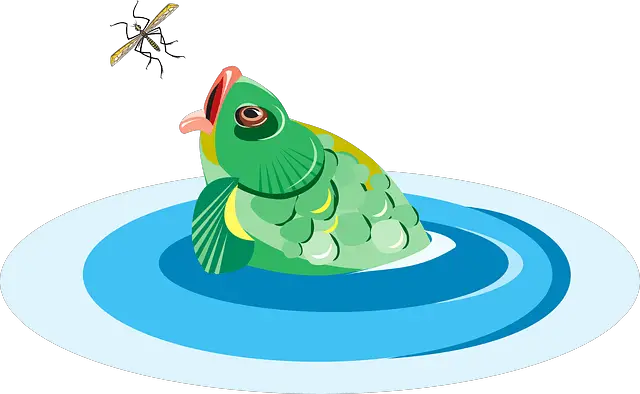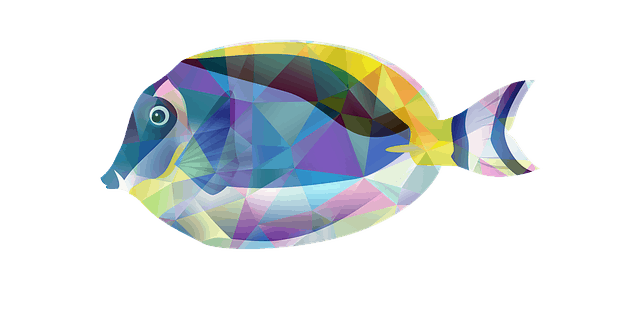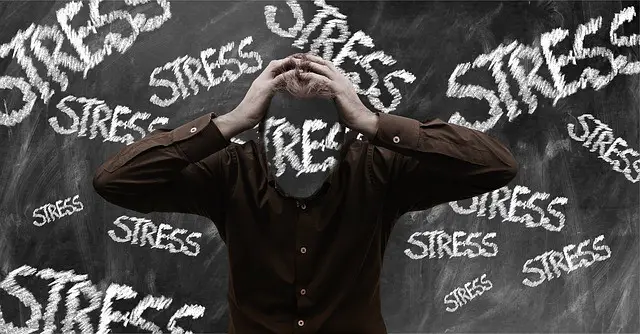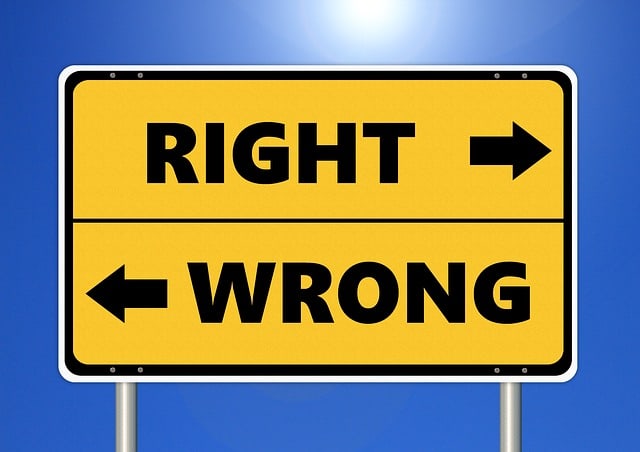Aquarium fish are popular pets, but do they have control over their food intake? As a aquarist, you may have heard about the ‘belly full mystery’ and are now wondering if fish have the ability to recognize when they’re full – do they instinctively know when to stop eating?
Most aquarium fish will stop eating when full. However, there are a few species (bettas, goldfish, pea puffers, etc.) that’ll continue eating as long as food is available, even to the point of ‘exploding’ – not literally but rather by way of fatty liver disease which includes stomach ulcers and abdominal swelling!
Now that you know fish in captivity typically stop eating once full, let’s ‘dive deeper’ into this topic. Together we’ll discover if fish know when it’s feeding time, how to recognize when a fish is full, what happens if fish eat too much, what factors influence aquarium fish feeding habits, how food quality affects fish behavior, how fish act when overfed, and if it’s possible for fish to ‘explode’ when overfed.
So, if you’re ready to learn more about the feeding habits of aquarium fish and how to keep them healthy and sustained in captivity, then let’s begin!
Do Fish Know when it’s Feeding Time?
Most fish in captivity know when it’s feeding time, especially those that have been in an aquarium for many years. They relate your presence with being fed which is why they’ll often swim closer to the glass or up to the surface when you enter the room.
If you take your finger and move it back-and-forth along the outside wall of the tank, aquarium fish will often follow it in anticipation of being fed. They’ll also become for more active when they see you. These behaviors are additional proof that captive fish know when it’s feeding time.
What Happens if Fish Eat too Much?
If fish eat too much too often, they’ll likely die. In fact, it’s more common for aquarium fish to die from overfeeding than it is from starvation. Overfeeding typically leads to increased ammonia levels in the tank, which result from uneaten food sinking to the bottom of the tank and then rotting.
Overfed fish may also appear to ‘explode,’ meaning they swell significantly in the belly area. You may also notice exposed intestines and/or tissue damage. Rupturing of the stomach can also be the result of swim bladder disease – a bacterial infection which if not treated promptly can lead to death.
Will Fish Explode if They Eat too Much?
There are some species of fish that will eat so much they explode – not, literally, however! Exploding fish is a myth however, certain fish types like bettas, pea puffers, goldfish, etc. can easily develop fatty liver disease from overeating and exhibit an overly rounded midsection or bloated belly that’s not normal.
How do You Know when a Fish is Full?
You can tell a fish is full when they spit out food or don’t accept it when offered. Should you notice excess food along the substrate, chances are you’re overfeeding your aquatic pets. To ensure this doesn’t happen, feed fish once or twice a day with just enough food to be eaten in a 2-minure time-period.
How can You Tell if You’re Feeding Your Fish Enough?
You’ll know if you’re feeding fish enough by the amount of leftover food along the substrate. Begin by observing how much food fish eat in the first minute. If they devour everything offered in under 60 seconds, then you’re giving them the right amount.
How do Fish Act when Overfed?
Overfed fish may act sluggish when overfed. This is due in part to an overworked digestive system and/or weight gain from excessive caloric intake. Overfed fish can also become ill if the water quality is altered due to overfeeding which can also explain their lethargic nature.
Overfed fish also tend to be calmer in captivity since they don’t feel the need to compete for food. Aggression levels among tank inhabitants is typically higher when food is scarce. Keeping aquarium fish well-fed (though not overfed) is important in maintaining a healthy, peaceful aquatic environment.
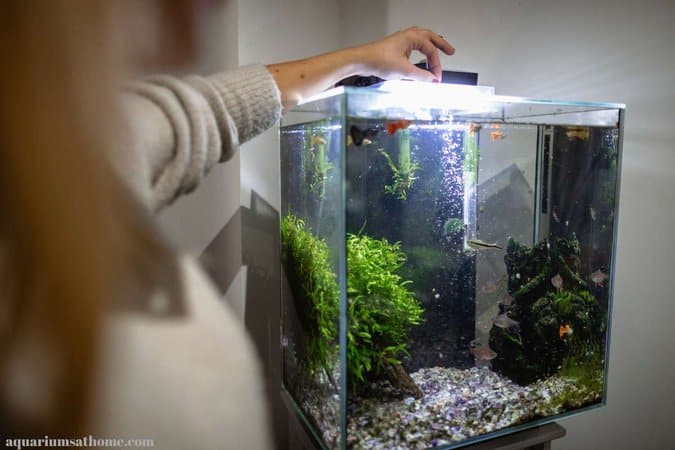
What are the Signs of Overfeeding Fish?
Overfeeding fish in captivity can be detrimental, not only to the health of the tank inhabitants but also to the ecological balance within the aquarium. The most common signs that you’re overfeeding your pet fish include the following:
- Heightened fish aggression towards tankmates.
- Fish are lethargic or less active than usual.
- Overweight fish.
- Excess food along the bottom of the tank.
- Food floating along the surface of the tank.
- Cloudy or ‘dirty’ water.
- Lower than usual pH levels.
- Increased ammonia levels.
Do Fish Eat Even when not Hungry?
Many fish in captivity will eat even when not hungry. This is typically done out of boredom which is why providing both physical and mental stimulation is so important. Most fish are opportunistic feeders, meaning they’ll eat whatever is available whenever it’s available.
To prevent fish from overeating, keep feedings to a maximum of twice per day. This will help to ensure your aquatic pets aren’t eating to excess. As well, only give them enough food to be consumed in a 2- to 3-minute time-period.
What Factors Influence Aquarium Fish Eating Habits?
Factors that affect eating habits of aquarium fish include the availability of food, the presence of other fish, and the water temperature. If food is scarce, fish will become aggressive and fight for food. Also, when the water is warmer, fish get hungrier since their metabolism increases in higher temperatures.
Other factors such as genetics, age, and size also affect fish eating habits in captivity. Some species are prone to overeating due to their inherent makeup. As well, juvenile aquarium fish have different eating habits than adult fish and larger fish will also consume more food than smaller fish.
Does Food Quality Affect Aquarium Fish Eating Habits?
Both food quality and quantity affect aquarium fish habits. If the food provided is of high-quality, then it will sustain fish longer than ‘filler’ food sources. Depending on the species of fish you keep, ensure you provide your aquatic pets with a balanced, nutrient-rich diet to keep them healthy and well–nourished.
Can Aquarium Fish Regulate Their Food Intake?
Some species of aquarium fish have been observed to limit their food intake in response to changes in water temperature or food availability. Studies have shown that certain species will refuse to eat even when food is abundant, suggesting that they have some ability to recognize when they’re full.
Final Thoughts
To conclude, fish are opportunistic feeders, meaning they’ll consume food as it becomes available. Whether aquarium fish can recognize when they’re hungry is still up for debate. Certain species such as bettas, goldfish, and pea puffers are genetically prone to overeating.
Understanding aquarium fish eating behavior is vital for maintaining healthy and balanced aquarium ecosystems. Further research is needed to fully understand the complex mechanisms behind aquarium fish feeding behavior.
I hope this article has provided you with the information you seek regarding the eating habits of fish in captivity. Thanks for reading and good luck with your aquarium hobby!



